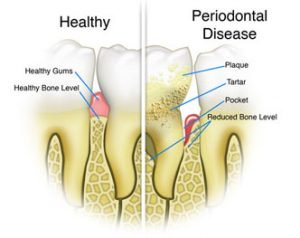Gum Disease: Periodontal Disease Burbank
Gum disease, also called periodontal disease, is common in Burbank and often goes unnoticed. It starts with red, swollen gums that may bleed during brushing or flossing. If untreated, it can cause tooth loss and other health issues. Regular brushing, flossing, and dental visits help prevent this condition. If you notice gum problems, see the best dentist in Burbank for advice and gum disease treatment.

What is Periodontal Disease?
Most people suffer from periodontitis without knowing because the earliest stage is usually painless. Gum irritation can signal various health issues. If untreated, inflamed gums can lead to more serious diseases. The condition weakens teeth, making them loose. Brushing and flossing keep the mouth healthy, but bacteria can still build up, forming plaque. Plaque that is not removed can harden into tartar.
What Does Gum Disease Look Like?
Dental plaque is a mix of bacteria, food bits, and saliva that sticks to the teeth. It starts as a sticky, colorless layer but turns brown or pale yellow when it hardens into tartar, also known as calculus. Plaque is usually found between teeth, on the front or back of teeth, along the gumline, and on chewing surfaces. When plaque and tartar are left unchecked, they can damage the gums and bone. Periodontal disease shows up as red, swollen, and bleeding gums. Regular brushing and flossing help remove plaque, but tartar can only be cleaned by a dentist.
Stages of Periodontal Disease
Periodontal disease progresses in stages, also known as types of gum disease, starting from mild gum inflammation to severe damage that can lead to tooth loss.
- Gingivitis: The earliest stage, marked by red, swollen, and bleeding gums due to plaque buildup. It is reversible with proper oral hygiene and regular cleanings.
- Early Periodontitis: Untreated gingivitis leads to receding gums and small pockets that trap bacteria. Mild bone loss begins, but prompt treatment can control the damage.
- Moderate Periodontitis: Deeper pockets and moderate bone loss occur. Gums may bleed more, and teeth can start to loosen. Deep cleaning is usually needed.
- Advanced Periodontitis: The most severe stage, with significant bone loss and deep infected pockets. Teeth may become loose or fall out. Treatment may involve deep cleaning, antibiotics, or surgery.

What are Gum Disease Symptoms?
The following are gum infection symptoms. If you have any of the following conditions, please contact our expert dentist at My Dentist Burbank today to schedule a complimentary appointment. Call 1-818-578-2332
- Bleeding gums – it is not normal when your gums easily bleed when brushing or flossing. bleeding gums can be a sign of gingivitis, the early stage of periodontal disease.
- Swollen, red or tender gums.
- Gums that recede or move away from the tooth.
- Persistent bad breath or bad taste in mouth- is a cause of bacteria in the mouth. One of the most common signs of periodontal disease is bad breath in the mouth may be a warning sign of periodontal disease. It is caused by the buildup of plaque on teeth.
- Loose teeth- is caused by weakening of periodontal fibers.
Pains when chewing foods. - Teeth that are sensitive to hot or cold temperatures.
- A new gap between the teeth is caused by loss of bone tissue.
Any of these symptoms may be a sign of a serious problem and the visit to the doctor is necessary.
Risk Factors of Gum Disease

The causes of inflammation are different. This can happen due to several circumstances. The risk factors of gum disease are:
-
- stone on teeth
- plaque
- bad hygiene of the oral cavity
- the use of toothbrushes incorrectly
- not regular professional dental cleaning
- deep caries
- fracture of the tooth
- orthodontic problems
- hormonal imbalance
Depending on the factors the treatment may differ.
Advanced Periodontal Disease Treatment at My Dentist Burbank
For advanced periodontal disease, specialized treatment is necessary to stop further damage. At My Dentist Burbank, we offer deep cleaning, medication, and surgical options to treat severe gum problems. Our team uses modern tools to remove tartar and bacteria from deep pockets. Regular follow-ups help manage the condition and prevent future complications. Make an appointment 0n ZocDoc or Call 1-818-578-2332 or Contact the best dentist in Burbank at My Dentist Burbank today to cure periodontal disease.


